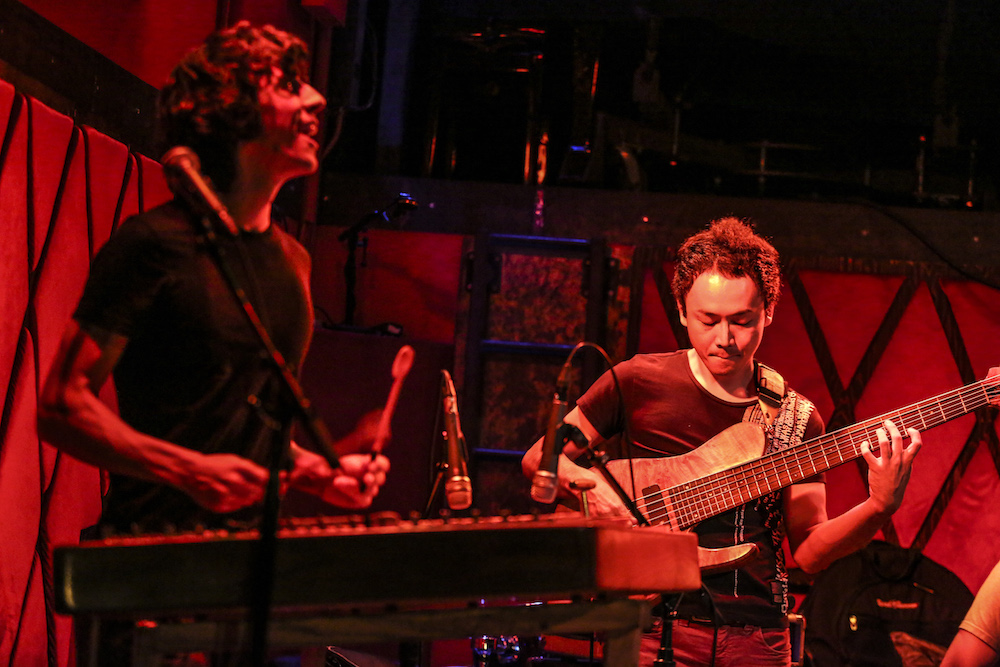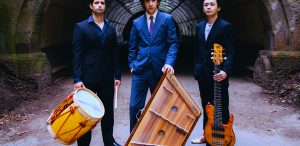Anybody that was fortunate enough to witness House of Waters open for Snarky Puppy at the O2 Apollo Manchester last year, will be privy to the trio’s awesome talents. Their audacious combination of hammered dulcimer, 6-string bass and percussion creates a truly unique sound – one which they explored masterfully on their eponymous 2016 album for GroundUP music.
The group consists of bassist Moto Fukushima, the man with the mallets Max ZT and Argentinian-born drummer/percussionist Ignacio Rivas-Bixio – though Luke Notary contributed percussion to their 2016 release. Moto plays with finesse, making use of pedals such as the Digitech Whammy to extend his range beyond the already expansive 6-string boundaries and Max ZT has phenomenal dynamic control – the natural resonance of his dulcimer giving a wash of character to their music.
Hamza is an outlier among their back catalogue. Ordinarily an instrumental outfit, House of Waters invited celebrated ‘playback vocalist’ Priya Darshini to collaborate with them on this very special track. Max ZT kindly agreed to take us inside the writing and recording of their atmospheric masterpiece, discussing how the song was formed and how Priya became involved.
‘We had been wanting to collaborate with Priya for years’ – Max ZT
How did Hamza first come into being – was it built around one particular rhythmic or melodic idea that we can hear in the final mix?
Max ZT: ‘It started with the dulcimer melodic line. From there we realized this line worked incredibly well with a traditional Nubian rhythm, and since we are inspired by the late-great Hamza El Din, we took a look at songs of his for influence. From there we added a traditional clap pattern that we heard in his music, and Moto added harmony and chords. Only after this, did we approach Priya Darshini and ask her to write a melody for Hamza’s lyrics.’
Do you tend to compose together in the rehearsal room, or separately in DAW’s/on paper and was the process for this composition different to your usual working methods?
Max ZT: ‘This piece was actually quite similar to others in our compositional approach. One of us would come up with a line, we’d sit together as a group and then from there, see what fits. Nothing was notated until much later.’
Did Priya Darshini join you in the studio to record her vocals or were they recorded remotely? At what point in the process was it decided to add vocals and was Priya the obvious choice?
Max ZT: ‘We had been wanting to collaborate with Priya for years. Our music though is generally quite hard for a vocalist as there is not a lot of space. We’re playing a lot of notes! This piece though had enough space and seemed like a perfect fit, and we can’t be happier with the collaboration. She recorded after everything was finished in a winding staircase in my home in Brooklyn. The reverb on her voice is all natural!’
On Hamza as well as throughout the album, you manage to cover the sonic spectrum with fairly minimal instrumentation. Did it require lots of ‘hands on’ work to make the dulcimer, bass, percussion, claps and vocals sit well together, or do their innate characteristics make it less challenging?
Max ZT: ‘In general we’re pretty lucky that our instrumentation allows for such a large harmonic sound. My instrument has 100 or so strings and it resonates for days, and Moto is playing a six-string bass, which allows for it to act like a combination of bass, guitar, and piano. Additionally our ranges rarely overlap, so there’s rarely a feeling that an instrument is stepping on another’s toes. And in this piece, we actually had to remove a ton of parts to allow there to be enough space for the vocals.’
Were you involved with the mixing and mastering of the track and if not, did you have any notes or ideas for the engineers? Was it an easy decision to say ‘right, this is finished’ – as that’s often something artists struggle to do?
Max ZT: ‘We mixed everything ourselves in our home studio, which allowed us to have a very “hands on” approach to the mix. The “this is finished” conversation is often difficult, but we tend to view albums more like a documentation of a time period, rather than an example of something “perfect.” And too be honest, we feel that perfection has nothing to do with what art and music is really about. We feel that perfection is not the point, and in reality it can often be a roadblock. Great art and great music comes from a place within one’s heart and soul. That place is often not perfect, and to represent it as such, is disingenuous. It has to be crafted of course, but to obsess will many times leave great art on the shelf for way too long…’
Having announced the completion of a new set of recordings during their February Paste Session, we’re extremely excited to hear both old and new material at their debut Band on the Wall show on Sunday 20th May.



